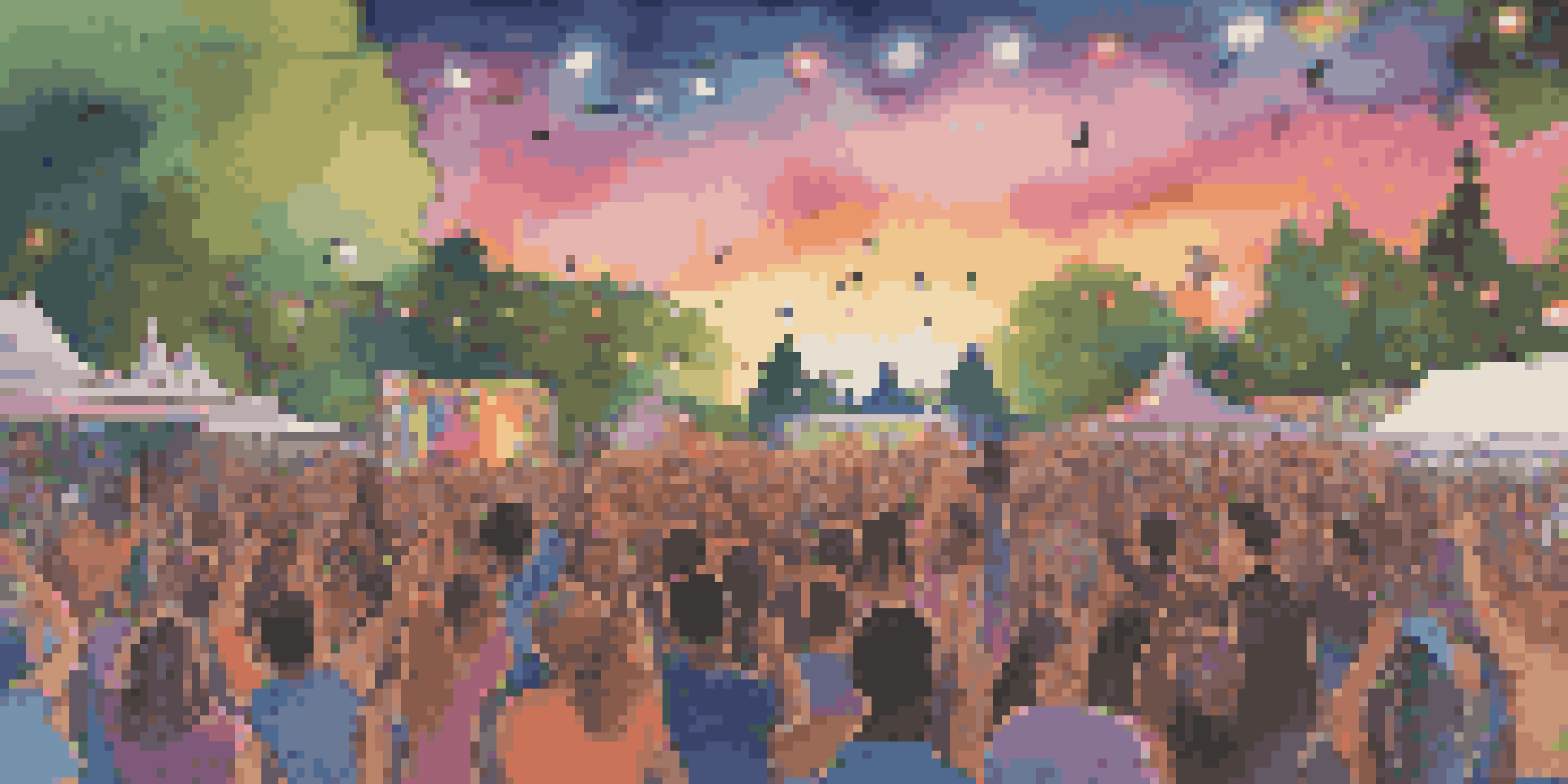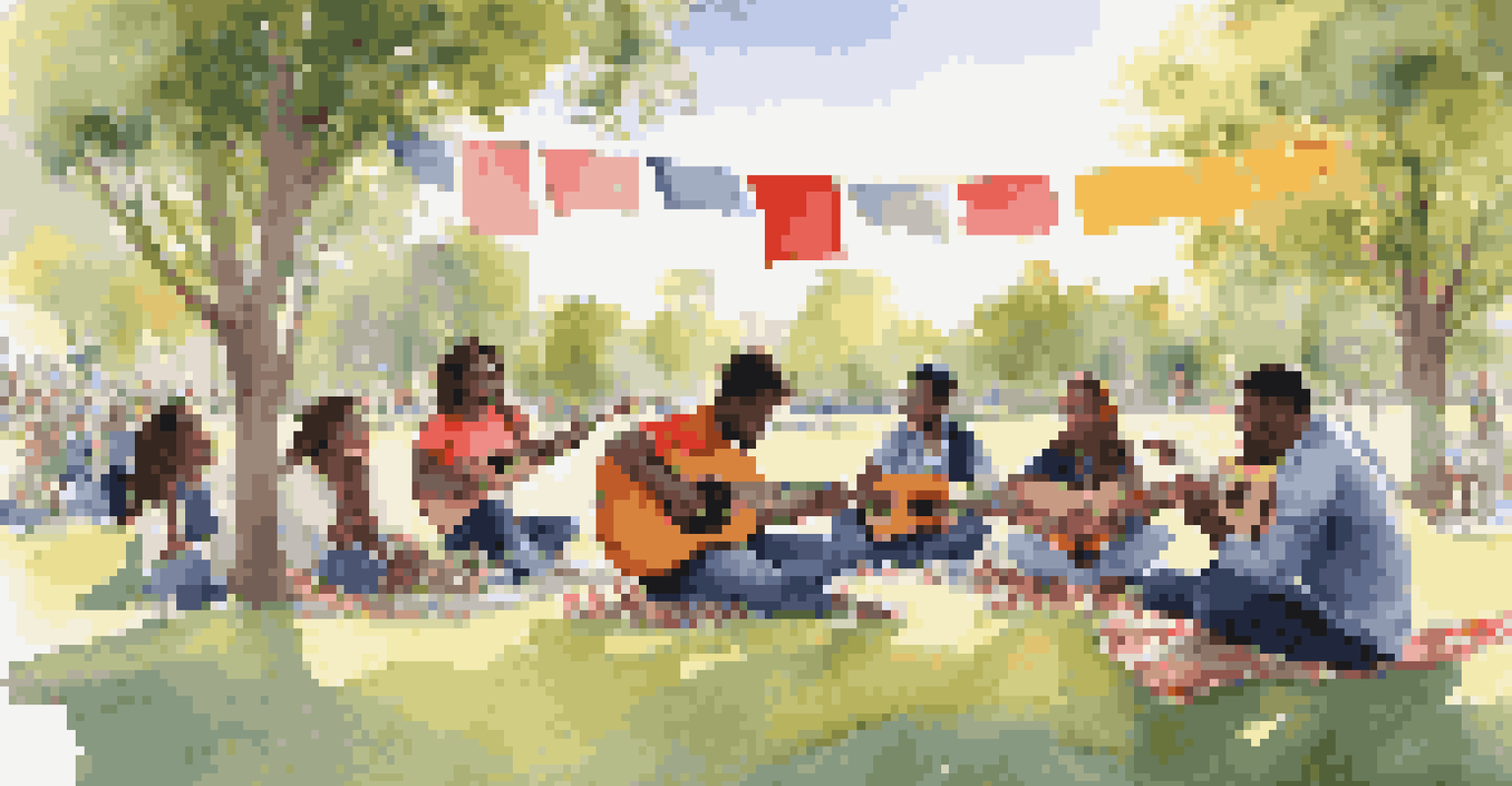The Influence of Global Music Genres on Local Politics

The Power of Music in Shaping Political Narratives
Music has always been a powerful tool for storytelling, and this is particularly true in politics. Genres like hip-hop, reggae, and folk often carry messages that resonate with social and political issues. These narratives can mobilize communities, inspire protests, and even influence public opinion, making music an essential part of the political landscape.
Music can change the world because it can change people.
For instance, think about how hip-hop artists have addressed systemic racism and inequality. Through their lyrics, they bring light to issues that might otherwise remain hidden from mainstream discourse. This ability to articulate the frustrations of marginalized communities helps to create a sense of unity and purpose.
Ultimately, music not only reflects the political climate but also shapes it, as artists use their platforms to challenge the status quo and encourage change. The interplay between music and politics is a dynamic relationship, where each influences the other in profound ways.
Cultural Exchange: Influences Across Borders
In our increasingly interconnected world, cultural exchange is more prevalent than ever. Music genres from different parts of the globe can find their way into local scenes, often bringing fresh perspectives to political issues. This fusion can give rise to new movements that challenge traditional political structures.

For example, the rise of Afrobeat, which blends traditional African music with jazz and funk, has been instrumental in addressing political corruption in Nigeria. Artists like Fela Kuti used their music to critique the government and inspire social change, illustrating how local music can adopt global influences to resonate with specific political contexts.
Music Shapes Political Narratives
Genres like hip-hop and reggae articulate social issues, mobilizing communities and influencing public opinion.
As these global influences permeate local music scenes, they can spark conversations about identity, representation, and justice. This kind of cultural dialogue enriches the political landscape and encourages a more inclusive approach to governance.
Music as a Form of Protest and Resistance
Throughout history, music has played a crucial role in protest movements. Whether it's the folk songs of the Civil Rights Movement or punk anthems challenging authority, music often serves as a rallying cry for those seeking change. These genres provide a platform for voices that might otherwise go unheard.
The songs we sing can either build bridges or walls, so let’s make sure we’re building bridges.
Take, for example, the reggae genre, which emerged from Jamaica and often conveys messages of resistance against oppression and injustice. Artists like Bob Marley not only entertained but also educated their listeners about social issues, inspiring generations to fight for their rights.
When people gather to sing these protest songs, they create a sense of community and shared purpose. This collective experience can empower individuals, turning personal frustrations into a broader political movement that seeks meaningful change.
The Role of Social Media in Amplifying Music's Impact
Social media has revolutionized how music is consumed and shared, significantly impacting its political influence. Platforms like Instagram, TikTok, and Twitter allow artists to connect with audiences instantly, spreading their messages far beyond their local communities. This accessibility can amplify the reach of politically charged music.
Consider how viral songs can spark global movements. Tracks like 'This Is America' by Childish Gambino not only entertained but also ignited discussions around gun violence and racism, demonstrating the power of music in the digital age. Social media channels become megaphones for artists, allowing them to engage directly with their listeners.
Cultural Exchange Fuels Movements
Global music influences local scenes, creating new movements that challenge traditional political structures.
As a result, music can serve as a catalyst for political activism, encouraging listeners to take action, whether it's attending protests, engaging in discussions, or voting. The synergy between music and social media creates an environment ripe for political change.
Local Genres and Their Global Political Repercussions
While global music influences local scenes, the reverse is also true. Local genres can resonate with international audiences, highlighting specific political issues to the global stage. This exchange can foster empathy and understanding across cultures, bridging gaps between diverse political contexts.
Take the example of K-Pop, which has gained immense popularity worldwide. Groups like BTS have used their platform to address mental health issues, youth empowerment, and social justice, resonating with fans across different countries. Their messages encourage dialogue on these vital topics, creating a ripple effect that transcends borders.
This phenomenon illustrates how local music can serve as a powerful voice in the global political arena, raising awareness of issues that might otherwise go unnoticed. The interconnectedness of music and politics in a global context fosters a more nuanced understanding of social justice and equality.
The Influence of Music Festivals on Political Engagement
Music festivals have become vibrant platforms for political engagement, often featuring artists who advocate for social change. These events draw large crowds and serve as an opportunity to discuss pressing political issues while enjoying live performances. The atmosphere of camaraderie can inspire attendees to become more politically active.
Consider festivals like Coachella or Glastonbury, where social justice initiatives are often highlighted. Activist organizations set up booths, encouraging festival-goers to learn more about various causes, from climate change to human rights. The fusion of music and activism creates a unique space for dialogue and engagement.
Social Media Amplifies Music's Reach
Platforms like TikTok and Instagram allow artists to spread politically charged messages, sparking global movements.
As attendees leave these festivals, they carry with them not just memories of performances but also a renewed sense of purpose. Music festivals, therefore, play a significant role in shaping the political landscape by encouraging collective action and awareness.
Future Trends: The Evolution of Music and Politics
As we move forward, the relationship between music and politics will continue to evolve. We can expect to see new genres emerge that reflect the changing political landscape, influenced by technology, culture, and social movements. This evolution will likely lead to innovative ways for artists to express their political messages.
For instance, the rise of virtual concerts during the pandemic showcased how live performances could adapt to meet the moment. Artists leveraged technology to connect with fans and address current issues, proving that music remains a vital tool for political expression, even in challenging times.

Looking ahead, the synergy between music and politics will remain strong, as artists continue to use their platforms to drive social change. The potential for music to inspire and mobilize communities will always be relevant, reminding us of its enduring power in shaping our world.